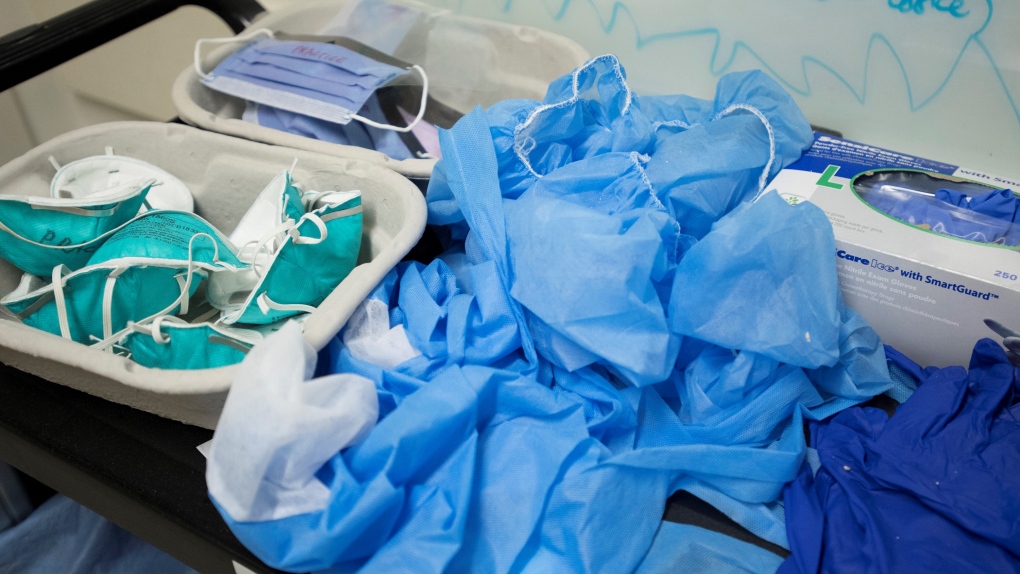'Decision not made lightly,' Lower Mainland health authorities say of hundreds of workers fired over COVID-19 vaccine
 Personal protective equipment used for simulation/practice is seen in the COVID-19 intensive care unit at St. Paul's hospital in downtown Vancouver, Tuesday, April 21, 2020. THE CANADIAN PRESS/Jonathan Hayward
Personal protective equipment used for simulation/practice is seen in the COVID-19 intensive care unit at St. Paul's hospital in downtown Vancouver, Tuesday, April 21, 2020. THE CANADIAN PRESS/Jonathan Hayward
Health-care workers fired from jobs in B.C.'s Lower Mainland over their decision not to get vaccinated against COVID-19 numbers in the hundreds, but according to local officials, they represent just a small portion of the workforce.
A representative of the two health authorities that monitor the province's most populous region told CTV News that a total of 674 employees have "had their employment terminated" for failure to comply with a provincial order that those in health care must be fully vaccinated.
While many have blamed B.C.'s vaccination policy on staffing shortages felt at hospitals and other facilities across the province, in the Lower Mainland, the policy accounts for less than one per cent of the workforce, the authorities say.
Last fall, it was reported by The Canadian Press that a total of 3,091 health-care workers across the province remained unvaccinated – 333 of whom were in the Vancouver Coastal Health region, and 573 of whom were employed in Fraser Health.
The update from VCH and FH provided last week to CTV suggests 232 of those workers have since been vaccinated and allowed to return to work.
In an email, the two authorities said the priority of teams in both regions was to manage the impact the public health order had on staffing levels, which meant contingency plans were put in place as the measure took effect.
Staff were warned that refusal to be vaccinated would mean they'd lose their jobs "after a defined period of leave." The Fraser and Vancouver Coastal health authorities said any unvaccinated workers were contacted directly in addition to advisories that went out to all employees.
Those who still refused to get their shots were fired.
"This decision was not made lightly and the human resources teams at both health authorities took extensive steps to engage with and support unvaccinated staff," a spokesperson for both told CTV.
B.C.'s health minister has noted several times that vaccination rates of medical professionals are among the highest in the province, but even a small dip in staff is likely a challenge for those still working.
The province has had to implement a policy that allows health-care workers who are known to have COVID-19 to return to work in some capacity to ensure teams aren't too short staffed to provide care.
Nurses who've spoken to CTV News in recent weeks say the situation is serious, describing staffing shortages for various reasons including illness as well as being responsible for up to triple the number of patients they feel they can safely care for.
According to B.C. Health Minister Adrian Dix, one week last month there were 27,937 shifts unfilled because so many workers were sick.
"We are also closely monitoring sickness levels across health services, especially in hospitals, long-term care and home support," Dix said at the time. "All health authorities are in the process of updating their contingency plans."
Nurses and doctors working in various wards have expressed frustration and exhaustion as they feel pressure to pick up overtime shifts amid intense mental and physical strain.
With files from The Canadian Press and CTV News Vancouver's Penny Daflos
CTVNews.ca Top Stories

PM Trudeau 'surprised' provinces unanimous on accelerated defence spending: Ford
Ontario Premier Doug Ford says his fellow provincial leaders are united in pushing for Canada to meet its NATO defence spending targets ahead of schedule, and that Prime Minister Justin Trudeau was "surprised" to hear it.
Immigrants take to the streets to protest against the freezing of immigration programmes
In response to the freeze on immigration programmes announced by Ottawa, an organization that defends the rights of immigrants is organising a demonstration in front of the Montreal office of the Quebec Ministry of Immigration, Francisation and Integration early on Saturday afternoon.
Muskoka reacts to major snowfall, Highway 11 still closed
From road closures, power outages, weather declarations and nonstop shovelling, Muskoka residents were faced with nearly a metre of persistent snowfall on Saturday.
Beef prices reach record highs in Canada
The cost of beef continues to rise, reaching record highs on grocery store shelves ahead of the busiest time for many grocers and butchers before the holiday season.
A man hid 5 treasure chests worth more than US$2 million across the United States. Here’s how to find them
Inside the chests, searchers can look forward to hopefully locating items such as rare Pokémon cards, shipwreck bounty, sports memorabilia, gold and precious medals.
Pedestrian killed by Via Rail train near Kingston, Ont.
Regular rail traffic has resumed with severe delays.
Shopping on Shein and Temu for holiday gifts? You're not the only one.
Welcome to the new online world of impulse buying, a place of guilty pleasures where the selection is vast, every day is Cyber Monday, and an instant dopamine hit that will have faded by the time your package arrives is always just a click away.
Bail and promises of justice: The case of Canadians Daniel Langlois and Dominique Marchand murdered in Dominica
A year has passed since Canadians Daniel Langlois and Dominique Marchand were found dead in a burned-out car in Dominica, and there has yet to be justice for the philanthropists who were beloved by many on the island.
Canadian team told Trump's tariffs unavoidable right now, but solutions on the table in surprise Mar-a-Lago meeting
During a surprise dinner at Mar-a-Lago, representatives of the federal government were told U.S. tariffs from the incoming Donald Trump administration cannot be avoided in the immediate term, two government sources tell CTV News.
































